Balbharti Maharashtra State Board Class 8 Civics Solutions
Chapter 1 Introduction to the Parliamentary System Notes, Textbook Exercise Important Questions and Answers.
Class 8 Civics Chapter 1 Introduction to the Parliamentary System Textbook Questions and Answers
1. Choose the correct option and rewrite the statements:
Question 1.
Parliamentary System of government developed in ……………. .
(a) England
(b) France
(c) United States of America
(d) Nepal
Answer:
(a) England

Question 2.
In the Presidential System, ……….. is the executive head.
(a) Prime Minister
(b) Lok Sabha Speaker
(c) President
(d) Governor
Answer:
(c) President
2. Complete the information in the following table.
Question 1.
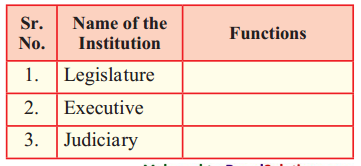
Answer:
3. Explain the following statements with reasons:
Question 1.
India adopted the Parliamentary System of government.
Answer:

Question 2.
Discussions and deliberations are important in a Parliamentary System of government.
Answer:
4. Answer the following in 25 to 30 words:
Question 1.
What is a Responsible Government?
Answer:
Question 2.
Enumerate the characteristics of the Presidential System of government.
Answer:
The following are the characteristics of the Presidential System of government:
5. Why is the role of opposition parties important? Write your opinion.
Question 1.
Why is the role of opposition parties important? Write your opinion.
Answer:
The role of opposition parties is important in Parliamentary as well as Presidential System of government.

Have you thought of this?
Project:
Watch the live telecast proceedings of the Lok Sabha and Rajya Sabha on the national channel Doordarshan and write your observations.
Class 8 Civics Chapter 1 Introduction to the Parliamentary Additional Important Questions and Answers
Choose the correct option and rewrite the statements:
Question 1.
The interrelationship between the Legislature, Executive and Judiciary is decided by the …….
(a) Government
(b) Presidential System
(c) Constitution
(d) Parliament
Answer:
(c) Constitution
Question 2.
The English Constitution is an …….. Constitution where governance is based on conventions.
(a) changeable
(b) unchangeable
(c) unwritten
(d) written.
Answer:
(c) unwritten

Question 3.
Sometimes, when no party gets a clear majority, ……… government is formed.
(a) Presidential
(b) coalition
(c) Military
(d) communist
Answer:
(b) coalition
State whether the following statements are True or False. Correct the False statement and rewrite:
Question 1.
Parliamentary System of government is considered as a contribution of United States of America.
Answer:
False.
Correct: Parliamentary System of government is a contribution of England.
Question 2.
In the Parliamentary System, the Legislature of the Central Government is known as the ‘Parliament’.
Answer:
True.
Question 3.
Members of the opposition party also take part in the discussion of the questions related to public welfare.
Answer:
True.

Question 4.
In the Parliamentary System, the President is directly elected by the people.
Answer:
False.
Correct: In the Presidential System, the President is directly elected by the people.
Find and write:
Complete the concept map:
Question 1.
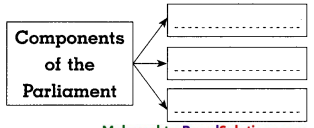
Answer:
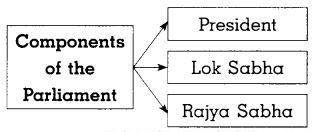
Question 2.

Answer:

Question 3.
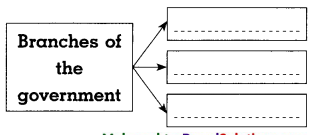
Answer:
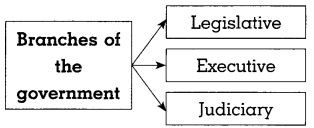
Write short notes:
Question 1.
Characteristics of Parliamentary System of India:
Answer:
The following are the characteristics of Parliamentary System adopted by India:

Question 2.
Responsibilities of the Executive in India:
Answer:
The Executive in India has to fulfill following responsibilities:
Explain the following statements with reasons:
Question 1.
No-confidence motion is an effective tool of keeping a check over the Executive.
Answer:
Question 2.
The Parliament is of great importance in the Parliamentary System of government.
Answer:
Since, the Parliament reflects the wishes and opinions of the people of the nation, it is of great importance.

Have you thought of this?
Question 1.
What is a Parliamentary System of government?
Answer:
Question 2.
In India we have Prime Minister but why is there no Prime Minister in the United States of America?
Answer:
Question 3.
What is the difference between a Parliamentary and a Presidential System of government?
Answer:
Difference between the Parliamentary and Presidential System of government is as follows:

Question 4.
Why is the role of opposition parties important? Write your opinion.
Answer:
The role of opposition parties is important in Parliamentary as well as Presidential System of government.
Chapter 1 Introduction to the Parliamentary System Notes, Textbook Exercise Important Questions and Answers.
Class 8 Civics Chapter 1 Introduction to the Parliamentary System Textbook Questions and Answers
1. Choose the correct option and rewrite the statements:
Question 1.
Parliamentary System of government developed in ……………. .
(a) England
(b) France
(c) United States of America
(d) Nepal
Answer:
(a) England

Question 2.
In the Presidential System, ……….. is the executive head.
(a) Prime Minister
(b) Lok Sabha Speaker
(c) President
(d) Governor
Answer:
(c) President
2. Complete the information in the following table.
Question 1.

Answer:
| Sr. No. | Name of the institution | Functions |
| 1. | Legislature | To make laws |
| 2. | Executive | To implement laws, frame policies |
| 3. | Judiciary | To provide justice |
Question 1.
India adopted the Parliamentary System of government.
Answer:

Question 2.
Discussions and deliberations are important in a Parliamentary System of government.
Answer:
4. Answer the following in 25 to 30 words:
Question 1.
What is a Responsible Government?
Answer:
Question 2.
Enumerate the characteristics of the Presidential System of government.
Answer:
The following are the characteristics of the Presidential System of government:
5. Why is the role of opposition parties important? Write your opinion.
Question 1.
Why is the role of opposition parties important? Write your opinion.
Answer:
The role of opposition parties is important in Parliamentary as well as Presidential System of government.

Have you thought of this?
Project:
Watch the live telecast proceedings of the Lok Sabha and Rajya Sabha on the national channel Doordarshan and write your observations.
Class 8 Civics Chapter 1 Introduction to the Parliamentary Additional Important Questions and Answers
Choose the correct option and rewrite the statements:
Question 1.
The interrelationship between the Legislature, Executive and Judiciary is decided by the …….
(a) Government
(b) Presidential System
(c) Constitution
(d) Parliament
Answer:
(c) Constitution
Question 2.
The English Constitution is an …….. Constitution where governance is based on conventions.
(a) changeable
(b) unchangeable
(c) unwritten
(d) written.
Answer:
(c) unwritten

Question 3.
Sometimes, when no party gets a clear majority, ……… government is formed.
(a) Presidential
(b) coalition
(c) Military
(d) communist
Answer:
(b) coalition
State whether the following statements are True or False. Correct the False statement and rewrite:
Question 1.
Parliamentary System of government is considered as a contribution of United States of America.
Answer:
False.
Correct: Parliamentary System of government is a contribution of England.
Question 2.
In the Parliamentary System, the Legislature of the Central Government is known as the ‘Parliament’.
Answer:
True.
Question 3.
Members of the opposition party also take part in the discussion of the questions related to public welfare.
Answer:
True.

Question 4.
In the Parliamentary System, the President is directly elected by the people.
Answer:
False.
Correct: In the Presidential System, the President is directly elected by the people.
Find and write:
Complete the concept map:
Question 1.

Answer:

Question 2.

Answer:

Question 3.

Answer:

Write short notes:
Question 1.
Characteristics of Parliamentary System of India:
Answer:
The following are the characteristics of Parliamentary System adopted by India:

Question 2.
Responsibilities of the Executive in India:
Answer:
The Executive in India has to fulfill following responsibilities:
Explain the following statements with reasons:
Question 1.
No-confidence motion is an effective tool of keeping a check over the Executive.
Answer:
Question 2.
The Parliament is of great importance in the Parliamentary System of government.
Answer:
Since, the Parliament reflects the wishes and opinions of the people of the nation, it is of great importance.

Have you thought of this?
Question 1.
What is a Parliamentary System of government?
Answer:
Question 2.
In India we have Prime Minister but why is there no Prime Minister in the United States of America?
Answer:
Question 3.
What is the difference between a Parliamentary and a Presidential System of government?
Answer:
Difference between the Parliamentary and Presidential System of government is as follows:
| Parliamentary System | Presidential System |
| 1. President is the Constitutional Head. | President is the Executive Head. |
| 2. Prime Minister and Council of Ministers have more powers. | President has more powers. |
| 3. Council of Ministers is formed by the elected members of Parliament. | President is directly elected by the people. |
| 4. Parliament can remove the Prime Minister by passing a no-confidence motion. | President can be removed only by impeachment. |
| 5. Members of the Executive are also the members of the Legislature. | Legislature and Executive are not dependent on each other. |

Question 4.
Why is the role of opposition parties important? Write your opinion.
Answer:
The role of opposition parties is important in Parliamentary as well as Presidential System of government.